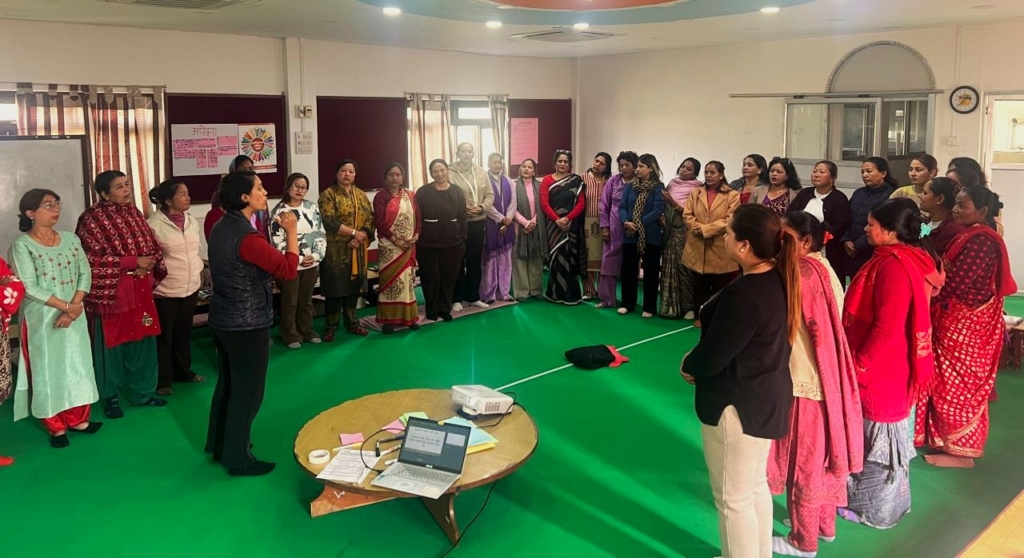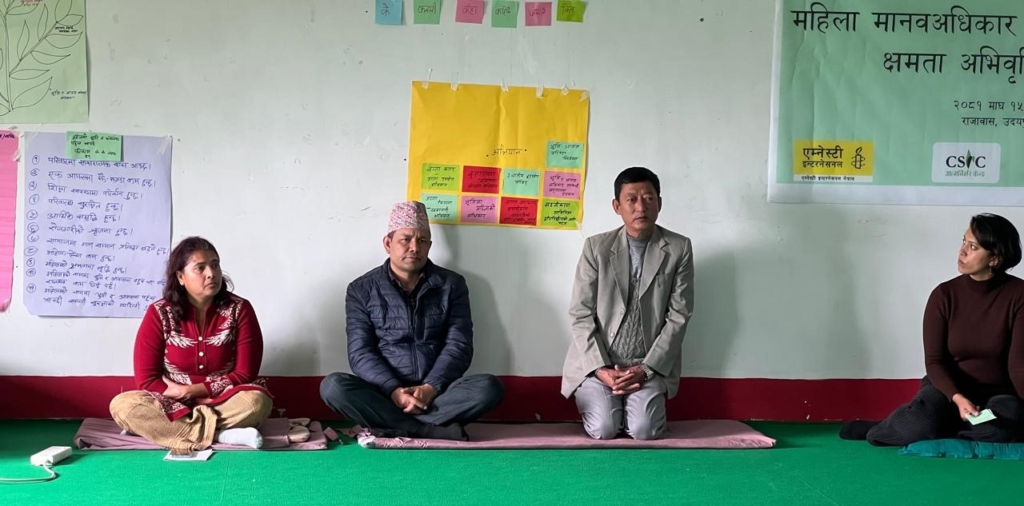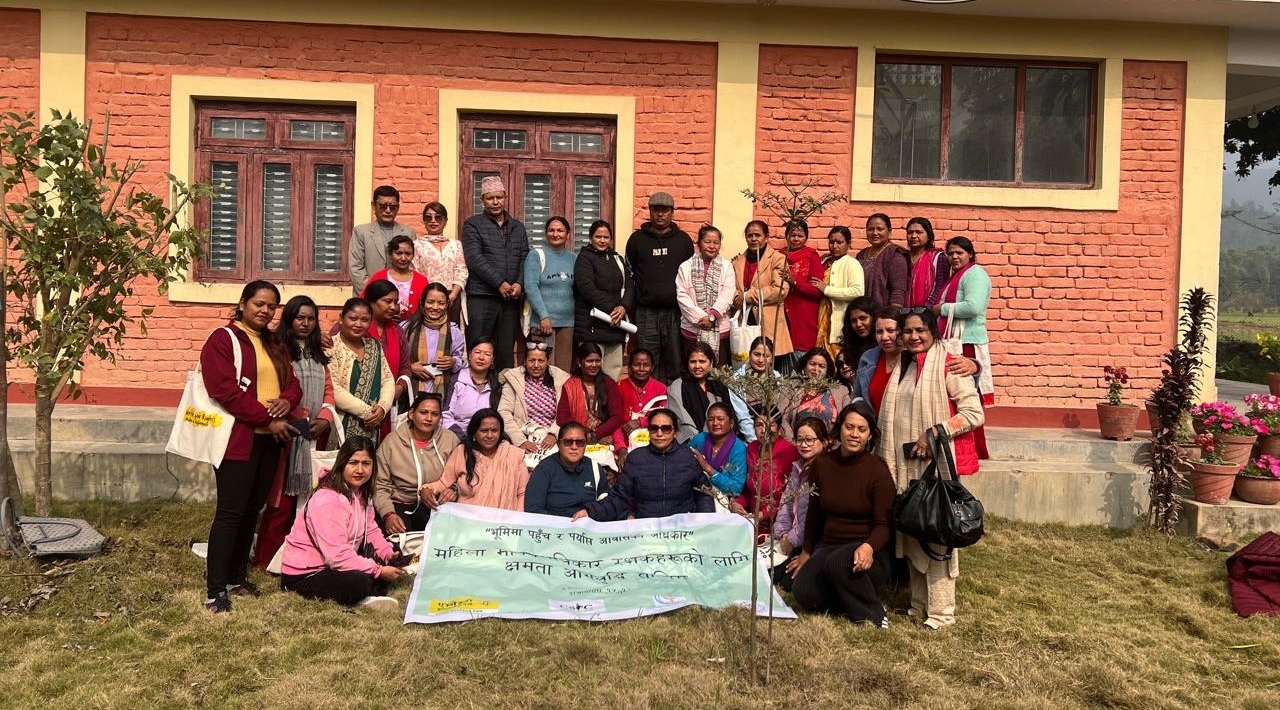Amnesty International Nepal (AI Nepal), Community Self-Reliance Centre (CSRC), Nepal Mahila Ekata Samaj (NMES), and the National Alliance of Women Human Rights Defenders (NAWHRD) jointly organised a training program on access to land and right to adequate housing on 27 and 28 January 2025 in Rajabas, Udayapur, to women human rights defenders (WHRDs) from different districts of Madhesh and Koshi province. The primary objective of the training was to consolidate the conceptual understanding of the WHRDs on access to land and right adequate housing while exploring effective collective advocacy measures at the local level to ensure the landless people and those living in informal settlements are not driven to homelessness by state and non-state interventions.
A total of 34 WHRDs, representing NAWHRD, NMES, AI Nepal and Nepal Land Rights Forum (NLRF), from 11 districts of Koshi and Madhesh Province had attended the training.

Opening Session
Opening the training programme, Sabita Pokhrel, Secretary of NAWHRD, highlighted the importance of women’s access to land and resources emphasising the link between gender-based violence and access to land. She thanked AI Nepal for taking the lead in organising the training at a crucial time when the district offices of the newly revived Land Issue Resolving Commission are appointing office bearers. She stressed the constitutional mandate of the Land Commission to provide land to the landless and the increasing roles of local and provincial governments in this process.
Following the introduction of participants, an expectation-sharing session was conducted. Most participants sought a clear understanding of compensation mechanisms for forced evictions and the land allocation process for landless individuals. They also wanted to explore strategies for improving women’s access to land, advocating for land rights and raising awareness about land-related rights, legal frameworks and policies.
Key Sessions
This was then followed by a presentation by Nirajan Thapaliya, Director of AI Nepal, on the topic of Access to Land and Right to Adequate Housing as fundamental human rights, where he discussed challenges such as forced evictions and inequalities faced by marginalised groups, highlighting the importance of legal and human rights frameworks, gender inclusion, and the need for collaborative advocacy to ensure secure land tenure and housing rights.
Jagat Deuja, Executive Director of CSRC, highlighted the deep connection between humans and land, explaining its economic, social, and cultural significance. He pointed out that while land is directly and indirectly related to job security, identity and status, ownership remains a challenge, especially for women. He emphasised the need for fair land distribution and legal recognition to guarantee complete land rights for everyone.
The group discussion session, facilitated by Bhagawati Adhikari of NMES and Ashmita Sapkota of AI Nepal, divided participants into various groups to discuss common myths about landless individuals, informal settlers, street vendors, and forced evictions. The discussion helped debunk misconceptions and enhanced participants’ understanding of the root causes of landlessness.
Wrapping up the sessions, Jagat Deuja provided an overview of national policies and constitutional provisions related to land and housing rights. He used a tree diagram format to illustrate the opportunities available within the legal framework.

A sharing session followed, where landless activists from Dharan Metropolitan City shared their experiences of residing in landless communities and advocacy for adequate housing. Hira Devi Rai raised issues as an elected ward representative and shared how she leads the formation of a committee under the municipal executive to manage landless and informal settlers. She also shared how, under her coordination, the committee has integrated landless and informal settlers into the municipality’s tax system. She also added that guidelines have also been developed, which introduce an annual tax structure for the houses, which resulted in approximately 6,000 landless households receiving house numbers and eventually gaining access to electricity, sewage, pitch roads and drinking water.
On the second day, participants collectively analysed the impacts of land and property ownership on individual women, families and society. Participants analysed how land and housing insecurity contributes to gender-based violence and discussed ways to address this issue. This session, facilitated by NAWHRD and NMES, led to the development of district-level action plans. The majority of participants planned to visit the District Land Issue Resolving Commission offices to advocate for the land rights of landless and informal settlers, enhance knowledge and understanding through collaboration with NMES, CSRC and the District Land Rights Forum and engage in local advocacy efforts.
Closing Session
In the concluding session, Bal Bahadur Tamang, Chair of the District Office of the Land Issue Resolving Commission, Udayapur, appreciated the training and expressed hope that participants would apply their knowledge in practical ways. As a former member of the NLRF, he talked about the joint land ownership campaign. He also acknowledged the challenges ahead for the Land Commission but assured his commitment to ensuring land ownership certificates are provided to the landless individuals and encouraged participants to coordinate closely with the District Office of the Land Issue Resolving Commission, as outlined in their action plans.

In her closing remarks, Sabita Pokhrel emphasised the need for organisations to work collaboratively at the local level to bring about meaningful change. She urged participants to document and report their collaborative local-level advocacy on access to land and adequate housing to the NAWHRD Secretariat.


